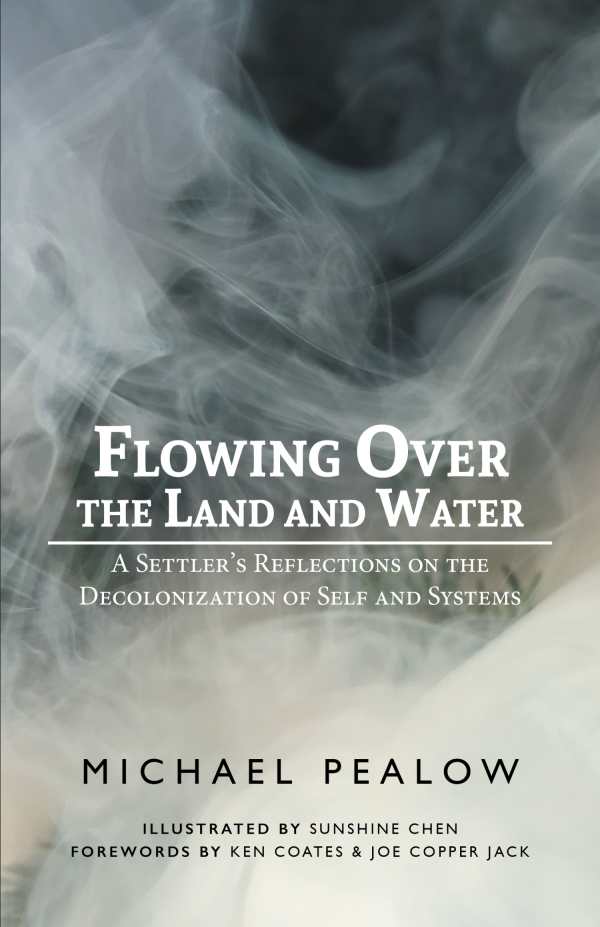Flowing over the Land and Water
A Settler's Reflections on the Decolonization of Self and Systems
Michael Pealow’s poetry collection Flowing over the Land and Water is an inhale before a reimagining of the gift of deceleration.
Michael Pealow’s poetry collection Flowing over the Land and Water is philosophical and pastoral, investigating the relationship between stewardship and the effects of colonialism.
Through a metamorphic notion of time and space, this collection seems to affect the internal conflict between progression, preservation, and play. Pealow suggests returning to natural systems to reconcile the insufficiency of human-made systems that exploit the resources of the floating rock that humanity resides on. Indeed, the epistemic navigation of the collection acknowledges that no entity exists in a vacuum, especially human beings, who are dependent upon the elements and shifting seasons to survive. Within leaps of etymology, poems like “Confluence” stress the importance of observance before action, as inspired action requires trust.
There is an empirical appeal to introspection; these poems ask that their readers note the process of being and becoming. They place their foci outside of human desire, on the responsibility of maintaining the terrestrial world for its compatibility with human living.
Pealow’s imagery is evocative, capturing minor seeds and the macro cosmos. When understanding hierarchical systems, the strength of the self is gained through returning to the basics; tenderness for the earth is positioned as the ultimate provider of both knowledge and resources. This collection is not unsympathetic to those who are lost in the hustle without consequence: in a dynamic interpretation of the intersection of the essential nature of abstract energy, “Self-Care”’s refrain states “I chose this— / For the treasure is in the discomfort.”
This seven-part collection examines the ways that humans negotiate their sensational involvement; it develops a keen sense of ecopoetics. With an omnipotent eye, the narrative speaker in poems like “The Moskitter” illustrates possible geniuses of destruction—there, through a personified firearm versus a beast. In the absence of formality and technology, there’s a fluid interpretation of what it means to slow down and simplify.
Part Five: Relationships presents an Ars Poetica entitled “Consensual Poetry,” which gathers all of the internal senses to maintain love and dedication to the craft. Indeed, throughout the collection, awareness of the fact that impact negates intention arises, ranging in expression from pithy couplets, to prose blocks, to visual poetry on silviculture. The visuals are exquisite, giving the book a familiar, mystical vibe. And always grounding is the book’s use of the prefix “re-”: it’s intent on appreciation as a principle of harmonious living.
Flowing over Land and Water is most surprising when it comes to its gorgeous illustrations by Sunshine Chen; there, humans are seen as companions to nature, almost blending into the simple shadows. The commercial honestly breaks the fourth wall in terms of human functionality by its high concern for witnessing it. “Upon the Throne” concludes “Come to think of it, / all my best poops have been outside.”
Suggesting that cultures need to propagate their knowledge to protect prosperity and current interests, the entries point to the incongruity of individuals being able to survive completely estranged from the nature they are derived from. Michael Pealow’s poetry collection Flowing over the Land and Water is an inhale before a reimagining of the gift of deceleration.
Reviewed by
Attorious Renee Augustin
Disclosure: This article is not an endorsement, but a review. The publisher of this book provided free copies of the book and paid a small fee to have their book reviewed by a professional reviewer. Foreword Reviews and Clarion Reviews make no guarantee that the publisher will receive a positive review. Foreword Magazine, Inc. is disclosing this in accordance with the Federal Trade Commission’s 16 CFR, Part 255.

